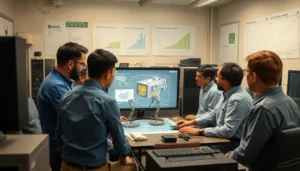Table of Contents
ToggleIn a world where robots are no longer just the stuff of sci-fi movies, robotics engineering companies are leading the charge into the future. These innovative firms are crafting everything from friendly household helpers to sophisticated industrial machines that can outwork a team of humans on a coffee break. If you think that sounds exciting, wait until you see what they can do!
Overview of Robotics Engineering Companies
Robotics engineering companies play a critical role in advancing technology. They design and manufacture robots that enhance efficiency across various sectors. These firms specialize in creating innovative solutions tailored for industries such as automotive, healthcare, and manufacturing.
Industries benefit greatly from the increasing automation capabilities of robots. For example, companies like Boston Dynamics and ABB work on developing industrial robots that streamline production lines. Their technologies result in increased output and reduced operational costs.
Research and development remain essential for these companies. Many invest heavily in artificial intelligence, enabling robots to learn and adapt. This investment leads to smarter, more autonomous machines capable of performing complex tasks.
Collaboration also drives advancements in this field. Robotics engineering companies partner with universities and research institutions to fuel innovation. Such partnerships often result in groundbreaking projects that push the boundaries of current technology.
Notably, robotics startups are emerging alongside established companies. Startups like Zipline focus on utilizing drones for delivery services, particularly in healthcare. Their success showcases the diversity and potential within the robotics engineering sector.
Diverse applications of robotics extend beyond traditional industries. Agricultural companies employ robots for precision farming, improving crop yields with less human intervention. Cleaning robots also become more sophisticated in household use, further integrating into daily life.
Robotics engineering companies significantly impact various sectors. Their work emphasizes innovation, collaboration, and advancement, reflecting the vast possibilities that robotics technology offers.
Key Players in the Industry

Robotics engineering features numerous companies that lead in innovation and application. These key players drive advancements through their cutting-edge technologies and unique methodologies.
Major Robotics Engineering Companies
Boston Dynamics excels in creating dynamic robots that navigate complex environments. ABB focuses on industrial automation, supplying robots that enhance production efficiency in manufacturing settings. Fanuc, another major player, specializes in CNC systems and factory automation solutions. KUKA designs robots for various industries, including automotive and logistics, optimizing workflows. Each company contributes distinct strengths, solidifying their positions in the robotics sector.
Emerging Startups
Numerous startups showcase promising innovations in robotics. Zipline revolutionizes healthcare delivery with drone technology, transporting essential medical supplies to remote areas. UiPath leads in robotic process automation, streamlining tasks across multiple business sectors. Soft Robotics offers flexible gripping solutions for delicate item handling in various settings. These emerging companies highlight the diverse applications of robotics, integrating modern technology into everyday operations.
Innovations in Robotics Engineering
Innovations in robotics engineering drive advancements across various sectors. Companies focus on leveraging technology to create more efficient robots.
Cutting-Edge Technologies
Artificial intelligence plays a pivotal role in developing autonomous robots. From image recognition to deep learning, companies enhance robots’ capabilities. Companies such as Boston Dynamics incorporate advanced sensors for real-time navigation. Collaborative robots, or cobots, support human workers in manufacturing environments. Robotics companies prioritize safety features in designs, ensuring seamless integration with human tasks. Additionally, remote operation technology allows for control across distances, expanding operational capabilities.
Trends Shaping the Future
Robotics engineering trends emphasize automation in everyday tasks. Increasing adoption of robotics in healthcare addresses patient needs efficiently. Precision agriculture utilizes robotics to optimize crop yields and reduce labor costs. Emphasis on sustainability drives companies to develop eco-friendly robots for various applications. Companies also explore robotics process automation for businesses, boosting productivity through streamlined tasks. As robotics technology evolves, workforce transformation is essential, leading to new roles in robotic maintenance and programming.
Challenges Faced by Robotics Engineering Companies
Robotics engineering companies encounter several obstacles that can hinder their progress and innovation. Two primary challenges are regulatory hurdles and market competition.
Regulatory Hurdles
Regulatory compliance presents significant challenges for robotics engineering companies. Adhering to local, national, and international regulations often requires considerable resources. Companies need to ensure that their robots meet safety and performance standards. Navigating these regulations can delay product development timelines and increase costs. Some companies face additional scrutiny related to data privacy and ethical concerns, especially with AI-driven robots. Understanding and adapting to evolving regulations is crucial for maintaining a competitive edge and fostering user trust.
Market Competition
Market competition intensifies pressure on robotics engineering companies. Numerous players, from established firms to startups, vie for market share across various sectors. Companies must invest continuously in research and development to innovate their products. Differentiation becomes vital in a crowded marketplace filled with similar technologies. Pricing strategies also play a critical role, as customers look for cost-effective solutions without compromising quality. Staying ahead requires agility and a keen understanding of industry trends and customer needs. Adapting swiftly can spell success amidst fierce competition.
Future Outlook for Robotics Engineering Companies
Expanding technology-related industries drive the future of robotics engineering companies. A strong emphasis on automation and artificial intelligence presents numerous opportunities for development. Robotics adoption across sectors, like healthcare and agriculture, is increasing. Companies are exploring innovative solutions, such as using drones for medication delivery and autonomous vehicles in farming.
Investments in research and development remain critical for these companies. As firms like Boston Dynamics and ABB continue enhancing their product lines, competition will intensify. Rapid advancements in AI enable machines to perform complex tasks previously reserved for humans. Companies investing in intelligent systems are likely to lead the market as consumers seek efficiency and effectiveness.
Emerging players also shape the landscape. Startups such as UiPath and Soft Robotics are creating new niches focused on robotics process automation and adaptable gripping technologies. Their innovative approaches complement those of established companies, driving the overall industry forward.
Collaboration stands out as a pivotal strategy among companies. Partnerships between tech firms and research institutions foster the sharing of knowledge and resources. Such alliances help to accelerate technological advancements and streamline the development of robotics solutions.
Challenges remain for the industry, including regulatory compliance and market competition. Navigating the intricate safety standards often complicates product rollouts. Maintaining a competitive edge requires continuous improvement and agility in adaptation.
Technologies such as 5G and the Internet of Things are set to enhance robot functionalities. Seamless connectivity will enable real-time data analysis, allowing for better decision-making and operational efficiency. Keep an eye on these developments, as they promise to redefine the boundaries of what robots can achieve in the near future.
Robotics engineering companies are at the forefront of innovation and technological advancement. Their contributions are transforming industries and enhancing everyday life through smarter and more efficient robots. The blend of artificial intelligence with robotics is paving the way for new capabilities that were once thought impossible.
As these companies continue to push boundaries they face challenges that require strategic thinking and investment. The future looks promising with emerging startups and established firms collaborating to create groundbreaking solutions. With the right focus on research and development the robotics industry is poised for remarkable growth, offering exciting possibilities across various sectors.






